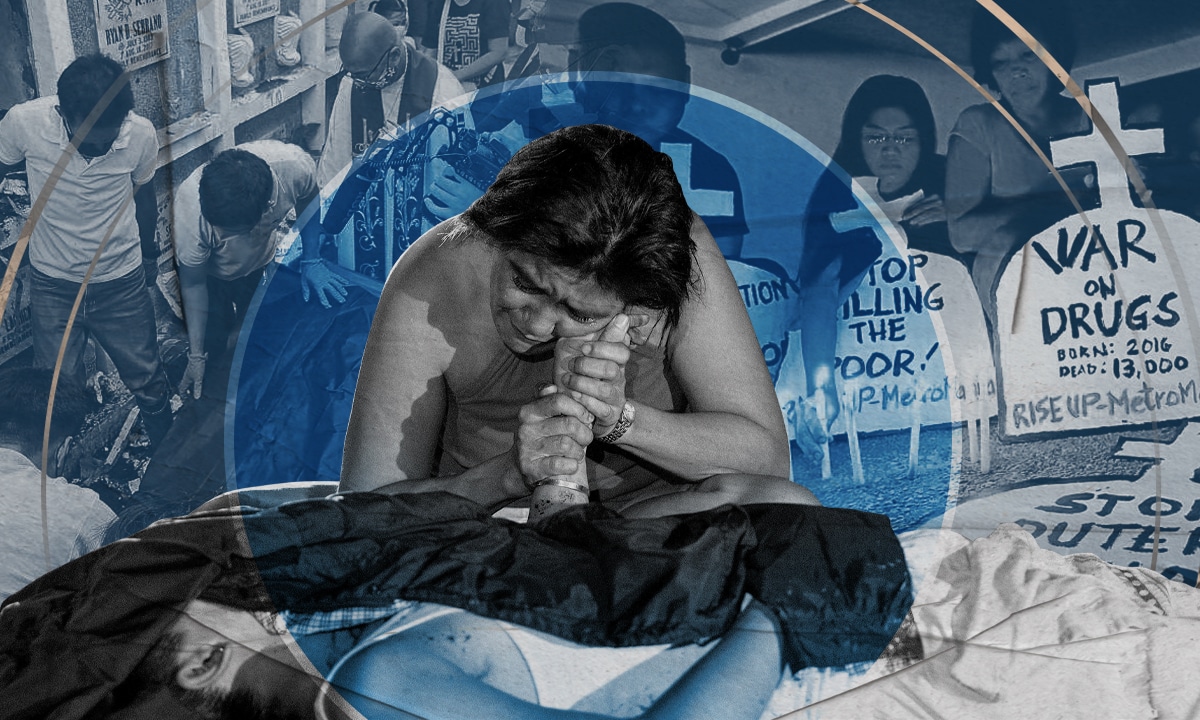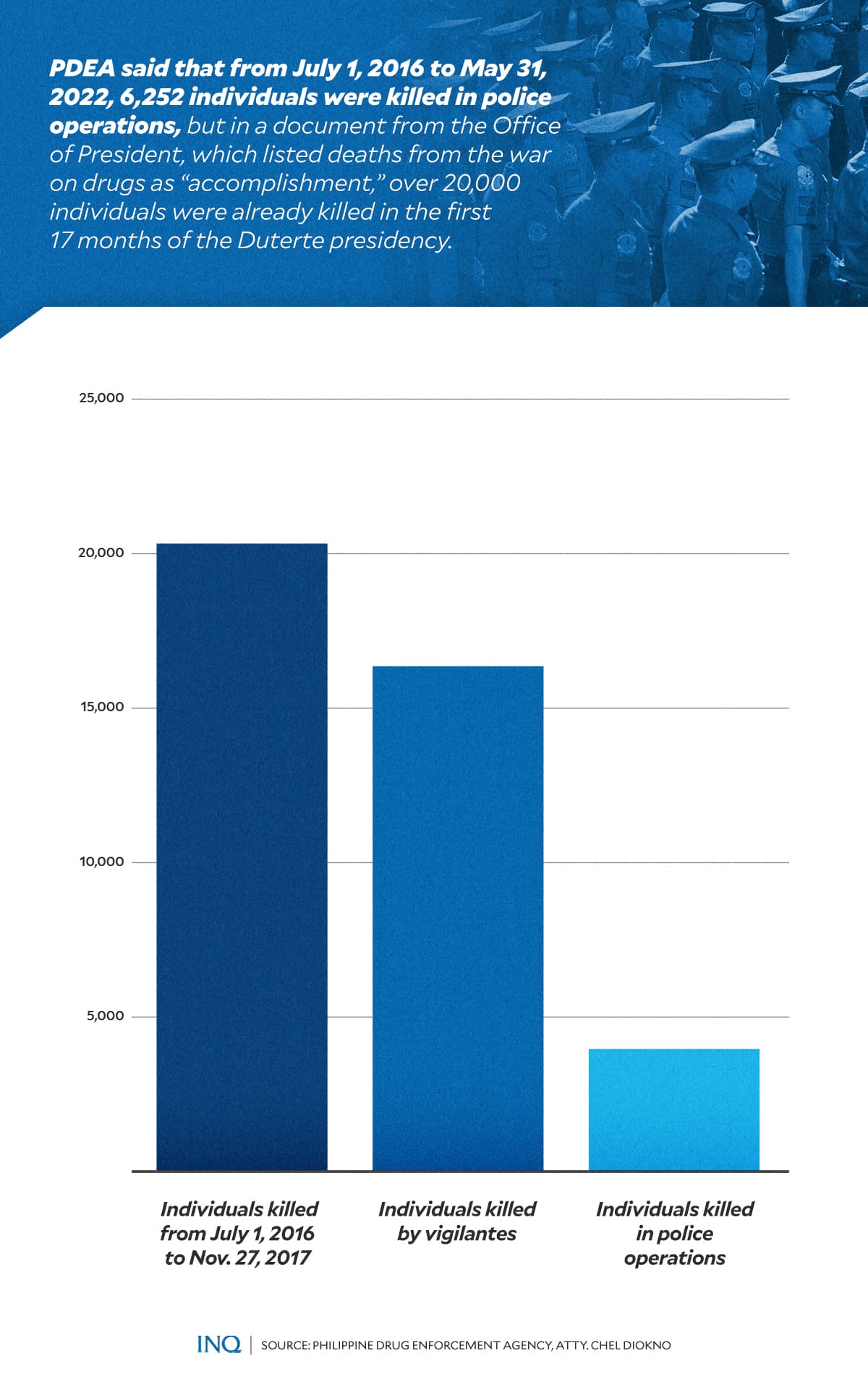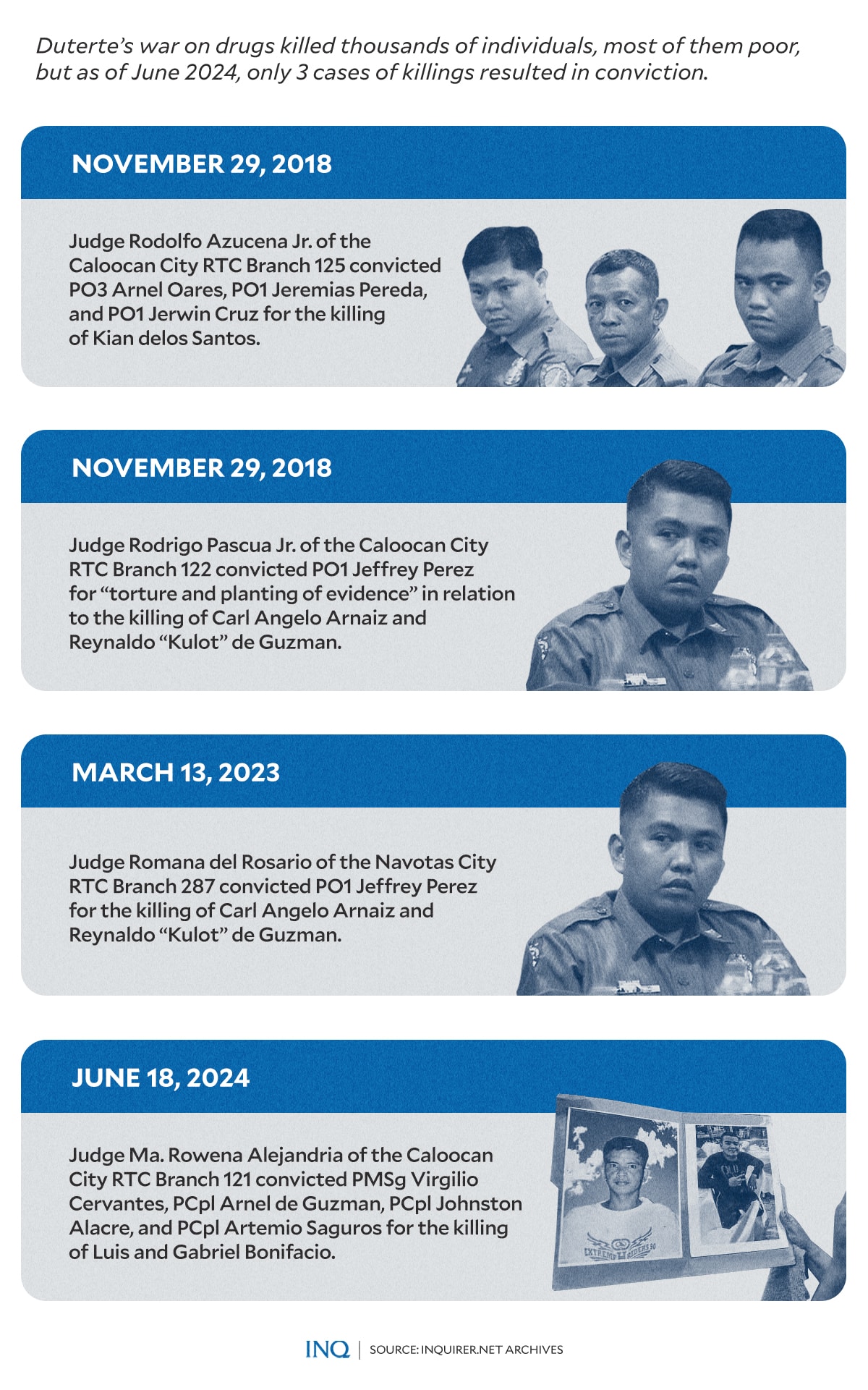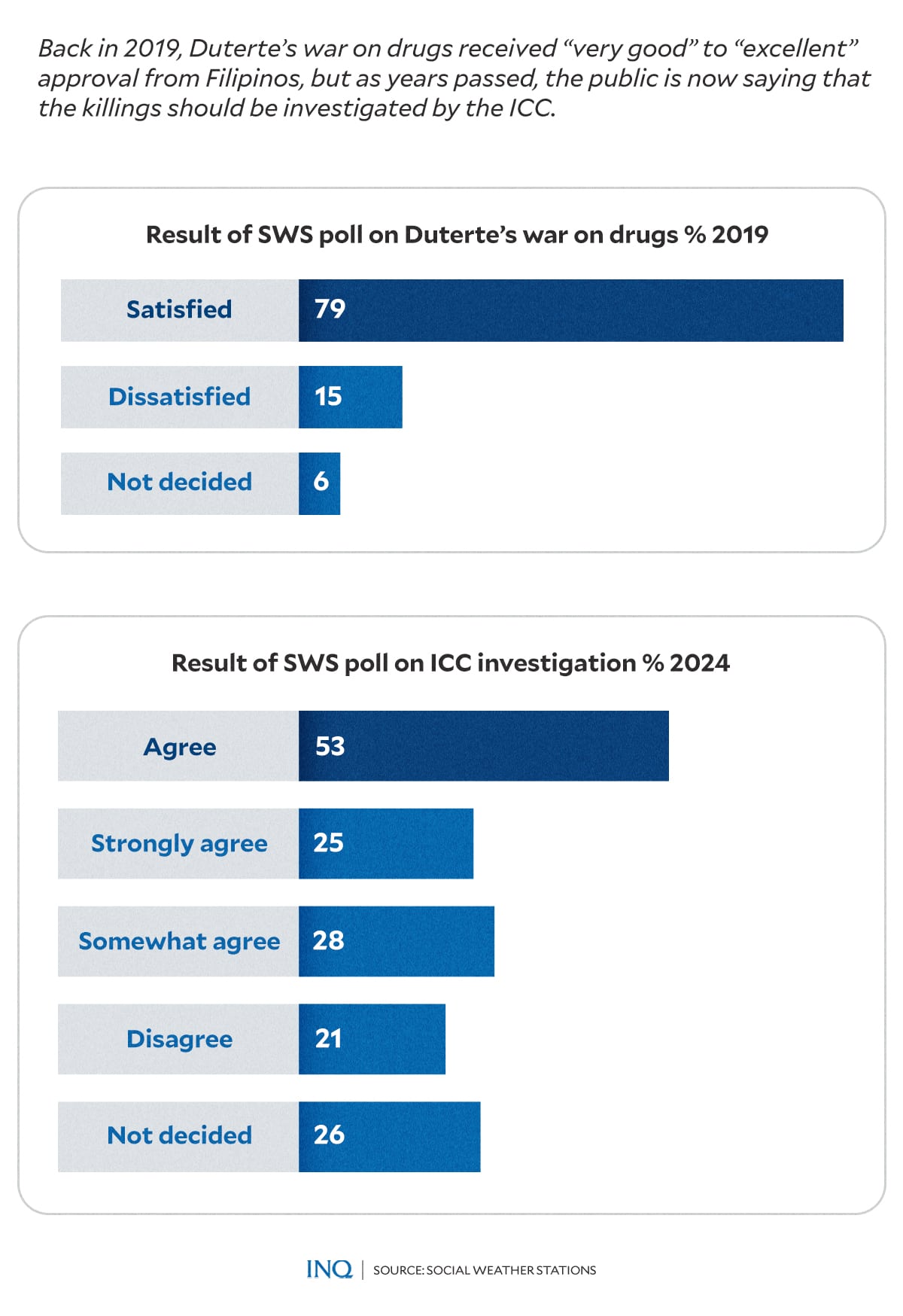MANILA, Philippines—As Rodrigo Duterte waged in 2016 a bloody campaign against drugs, thousands of suspects were killed by police and vigilantes, as stated in communication sent by victims’ relatives to the International Criminal Court (ICC).
The Philippine Drug Enforcement Agency (PDEA) listed 6,252 dead in anti-drug police operations from July 1, 2016 to May 31, 2022.
But a 2017 year end report attributed to the Office of the President (OP) listed more than 20,000 dead in the first 17 months alone of the Duterte administration.
Based on data shared by lawyer Jose “Chel” Diokno with the House Committee on Human Rights, which is investigating cases of extrajudicial killings (EJKs) in the anti-drug campaign, out of the 20,322 deaths listed as “accomplishment” by the OP report, 3,967 were killed in police operations and 16,355 in vigilante-style killings.
Diokno told INQUIRER.net that “it’s really something that has never happened before in our country, and it is really shocking to the conscience.”
He said that since the over 20,000 deaths pertain only to the first 17 months of Duterte as president, “you can only imagine how many more deaths have happened in six years.”
READ: Diokno: Duterte’s OP listed 20,322 drug-war deaths as accomplishments
Almost a decade on, out of all the killings from June 2016 to June 2022, only three cases have resulted in convictions – the cases of Kian Lloyd delos Santos, Carl Angelo Arnaiz and Reynaldo “Kulot” de Guzman, and Luis and Gabriel Bonifacio.
It was only on June 18 when Mary Ann Domingo cried inside the Caloocan City Regional Trial Court (RTC) Branch 121 as the policemen involved in the killing of her common-law husband and son, Luis and Gabriel, were convicted of homicide. They were shot and killed inside their shack in Caloocan City in 2016.
“[There was an] intent to kill,” Judge Ma. Rowena Alejandria said in her decision that sentenced the policemen to imprisonment of six years, eight months, and 21 days to eight years as minimum, and one day to 10 years as maximum. They were directed to pay P100,000 each, too, in damages.
READ: Caloocan court convicts 4 cops in father-and-son ‘drug war’ death
But while Domingo stressed that the verdict made her feel that “justice still exists,” she stated that the conviction strengthened her resolve to keep on fighting for her common-law husband and son: “Para makamit ko talaga ‘yung totoong hustisya (So that I can attain the real justice for them).”
“Kailangan [pa rin] namin ang ICC (We still need the ICC),” she said, pointing out that intervention from the ICC, which is already investigating Duterte’s bloodthirsty anti-drug campaign has always been her call not only for Luis and Gabriel but for all Filipinos killed.
The group Rise Up for Life and for Rights, which is representing the relatives of the victims who sent communication to the ICC, said “there will only be real justice when Duterte and former Philippine National Police (PNP) chief, now Sen. Ronald ‘Bato’ Dela Rosa are held to account for the war on drugs.”
‘Kill’ directives
As Diokno said, “the fact that there have only been four convictions related to the war on drugs when there were at least 20,322 killings from July 2016 to November 2017 is a strong indication that it is really difficult to prosecute the people behind the killings.”
He stressed this as the ICC, which is already investigating the crimes against humanity allegedly committed in the war on drugs, can only exercise jurisdiction when, in its view, the state is not willing or able to genuinely carry out criminal proceedings against those who are most responsible for the killings.”
Diokno pointed out that almost a decade since the start of the war on drugs, “there has been no investigation conducted by any government agency that looked into the liability of high-ranking officials, including the former president.”
READ: Duterte to cops: Kill criminals if you have to, I’ll protect you
Back in 2016, as Duterte started his presidency, he threatened to “kill” those involved in illegal drugs, even saying that if police could kill 1,000 individuals in the process, “I will protect you.” He said he is ready to die for the police.
Even when he was not yet elected as president, he declared that 100,000 people would be dead in his crackdown on illegal drugs, pointing out that dead bodies would fill Manila Bay. He had said, too, that he would be glad to kill millions of “addicts” in the Philippines.
READ: ‘Kill, kill, kill’: Duterte’s words offer evidence in ICC
Later on, when the Office of the Prosecutor (OTP) requested the ICC pre-trial chamber to investigate the Philippine campaign against drugs, Duterte’s remarks were considered useful as evidence, with then ICC prosecutor Fatou Bensouda saying that Duterte’s words indicated a policy to target civilians.
This was pointed out by lawyer and former senator Leila de Lima, who was imprisoned for over six years for charges she alleged were contrived to harass her for criticizing Duterte’s war on drugs from when he was still the mayor of Davao City.
READ: De Lima acquittal in last drug case gets cheers here and abroad
She said that there is reasonable, if not compelling, basis to say that Duterte’s statements were significant and relevant to the conduct of the killings of thousands of individuals in his six-year presidency.
“As head of the State, Duterte’s ‘kill, kill, kill’ order during his term gave the impression that killings pursuant to the drug war was a policy backed by the State,” De Lima told INQUIRER.net.
PH ‘made conducive for killing’
De Lima, who served as chairperson of the Commission on Human Rights and secretary of justice, said that the centerpiece campaign to “kill them all” is a clear example of how civil authority was used and weaponized to showcase thousands of dead bodies in the guise of ending the drug menace.
She stressed that without doubt, “it was Duterte’s statements which gave birth to a culture of impunity,” pointing out that in six years, killing was incentivized, with members of the PNP and vigilante groups rewarded for every dead body they claim credit for.
As pointed out by Diokno, in law, Duterte’s statements are considered extrajudicial statements that are admissible in court. “These can be used against him [and] they would be relevant because they came from him directly,” Diokno said.
De Lima, however, explained that Duterte’s words have to be put in context of the alleged Davao Death Squad (DDS) in 1990, saying that “our 2009 CHR investigation uncovered the modus operandi of the DDS,” which Duterte denied being involved with.
“When Duterte launched the drug war in 2016, it was strikingly similar to the 2000-2008 EJKs in Davao committed by the DDS that the CHR investigated,” she said.
“So Duterte merely nationalized his EJK policy, and replicated throughout the whole Philippines what his DDS did in Davao [City]. In criminal law, this is what we call a pattern of behavior, and proof of this pattern is admissible in a court of law,” De Lima pointed out.
She explained that “if you have a local official who was investigated for multiple summary executions in the past, and then he replicated this practice at the national level when he became president, his public statements are proof of this pattern of criminal behavior and can be presented in court.”
As lawyer and ICC assistant to counsel Kristina Conti said, transcripts of Duterte’s statements, courtesy of the official website of the then Presidential Communications Operations Office, were already sent to the ICC when the OTP was still determining whether it should open an investigation.
Strong evidence
For De Lima, “Duterte’s previous statements serve as his own admission of culpability and shall serve as strong evidence against him both in our local courts and before the ICC.”
“News articles, live recordings, and other forms of media will show that Duterte has admitted to being the culprit of EJKs throughout his term. Statements such as admissions and declarations against interest are proof and can be used as evidence,” she said.
Back in 2018, Duterte appeared to have taken responsibility for the killings in the war on drugs. “What are my sins? Did I steal money? Even just one peso? Did I prosecute somebody I sent to jail? My only sin is extrajudicial killings,” he said.
READ: Duterte: My only sin is the extrajudicial killings
As explained by Conti, statements such as those, which are against interest, are very significant because there is no incentive for someone to go against his or her interest.
RELATED STORY: Drug war victims’ lawyers agree ICC probe likely finished
De Lima pointed out that with regard to Duterte’s “kill” orders, “any president knows that any statement he makes in public is [a] state policy, and will be acted upon and implemented down the line as this is the way that all the governments in the world function.”
“This is how the drug war was implemented. Duterte publicly ordered his PNP to kill drug suspects and that is what they did,” De Lima, who was already cleared in all the cases charged against her, said.
“There is a one-to-one correspondence between his orders and what happened in reality, i.e., the deaths of thousands. That means his orders were carried out. He cannot now take back what he has been pronouncing for six years and say that he was just joking,” she said.
Conti told INQUIRER.net that aside from the list of statements of Duterte, also submitted to the ICC were copies of documents such as the Command Memorandum Circular No. 16-2016, government accomplishments, reports of alleged “quota system,” although it was already denied by the PNP, “kill” lists, and statements from the relatives of the victims.
READ: Bad political move not to cooperate with ICC probe – human rights lawyer
The PNP document, Command Memorandum Circular No. 16-2016, was issued by Dela Rosa and laid out the framework for Duterte’s anti-drug campaign, the Project Double Barrel. Conti made clear, however, that the OTP could have obtained evidence that “we still do not know of.”
Insider witnesses
Conti explained that the ICC would eventually look into two sets of evidence: (1) evidence of state action or policy, like how the Oplan Tokhang was initiated and carried out, and how government officials encouraged rights violations throughout the campaign, and (2) evidence on the cases of killings.
But she pointed out that evidence, such as statements from those who actually took part in the campaign, would be of great significance: “Taken together, from the top level, what was the directive, and then to the bottom level, the killings, so they [would] kind of meet in the middle.”
“They [would] kind of meet in the middle in the sense that you have to connect that the killings on the ground were consciously ordered by people who are most responsible for the crimes against humanity,” she said.
Based on the case of Germain Katanga, a rebel leader who was convicted by the ICC in March 2014 of war crimes and crimes against humanity for the attack on a village in the Democratic Republic of Congo, statements of rebel members were given weight.
For Conti, insider witnesses from the Philippines could provide the ICC with a better view of what really happened in Duterte’s campaign against drugs: “Insider witnesses could be the ones who can say more about the quota [system], the reward.”
READ: Trillanes: ICC has put over 50 PH cops on notice in drug war probe
“They serve to tell the court what is really happening outside of official documents and statements,” she said while stressing that “these are more compelling because they talk about the overt acts.”
“We’re looking at the actual commission of the crimes and the actual commission of the crimes will be best shown by those who actually implemented,” she said.
She pointed out that in most, if not all, cases, the ICC recognizes that not all kinds of orders, which are often adverse or bad, are on paper: “No one would write something ordering a killing.”





